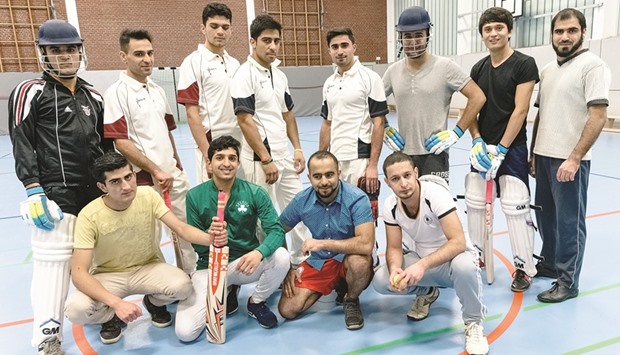Batsman Sadeeq Shinwari smiles with satisfaction. Together with a group of other refugees from Afghanistan, the 20-year-old has founded a cricket team as part of a local sports club in the north German town of Preetz.
Every Tuesday since mid-February, the group has gathered in the gym to practise their favourite sport.
“We’re not that interested in football,” says Abdulwase Haleem, who came up with the idea at the end of last year.
He’s been living in northern Germany for 15 months. He tried football and was even quite good at it, but his heart belongs to cricket.
“That was our national sport, I started playing as a child,” says the 25-year-old.
At least a dozen Afghans have come to the small school gym this evening. Before they reach for their bats they form a small circle and two new players introduce themselves.
Some of the refugees have come from further afield to play, from Ploen for example, 14 kilometres away, and the city of Kiel, half an hour away by car.
Marlene Sachse is the only woman in the group. The refugee worker played an important role in setting up the team.
Of the around 350 refugees currently living in Preetz, there are 50 Afghans.
“Abdulwase is integral to everyone here,” says Sachse. She partnered up with the FT Preetz sports club and secured the team the use of the gym.
“We’re the third club in the state of Schleswig-Holstein to offer cricket,” FT Preetz chairman Ralf Loehndorf says. “We’re trying to get it rolling.”
Loehndorf is also trying to get sports equipment for the cricket team via sports associations.
Without their help, it would be almost impossible in a small club like FT Preetz, which has only 600 members. A full team kit including bats, helmets and leg guards costs around 25,000 euros (26,500 dollars).
Up till now the refugees have trained by themselves. “I hope that a few Germans will join us soon,” says Sachse.
Today’s two new cricket players fill out membership forms for the club during the session to make sure the insurance is sorted. Their first year is free.
At home, Shinwari played semi-professional cricket at a sports school. Together with Haleem and two other Afghans, he has taken on the role of coach.
“Marlene, you’ve made my dream come true,” he tells Sachse. But his future in Preetz is uncertain.
The Federal Office for Migration and Refugees (BAMF) has rejected his asylum application, a decision which he is appealing.
If he isn’t allowed to stay in Germany he wants to apply in another country.
“Some of the boys are here for three years and then they get rejected,” says Sachse. “What’s the point of that?”
Germany should take note of how its northern neighbour Denmark deals with applications, she says. There, authorities usually make a decision within weeks.
Haleem had an interview with BAMF five months ago and is still waiting for a decision.
“In Afghanistan I worked as a translator for the army,” he says.
Because of this, Sachse thinks his chances of being granted leave to remain are good. “I don’t want to imagine what will happen otherwise,” she says.
The refugees are still on the lookout for a proper grass cricket pitch for the summer months. And then perhaps they can have their first match against another club.
Until then they’ve got lots to do. “We need to train,” says Haleem. “Lots of us haven’t had the necessary training for years.”
And perhaps he will eventually be granted his other dream of staying in Germany, he says. -DPA

